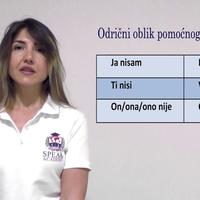Serbian Lesson 3.2 - Auxiliary verb "I am" (JESAM) - Serbian language courses
Сербский|Урок|Вспомогательный|глагол|Я|есть|ЕСАМ||язык|курсы
Serbian|Lesson|Auxiliary|to be|I|I am|I am|Serbian|language|courses
Serbisch-Lektion 3.2 – Hilfsverb „I am“ (I AM) – Serbisch-Sprachkurse
Σερβικά Μάθημα 3.2 - Βοηθητικό ρήμα "I am" (I AM) - Μαθήματα σερβικής γλώσσας
Serbian Lesson 3.2 - Auxiliary verb "I am" (I AM) - Serbian language courses
Lección de serbio 3.2 - Verbo auxiliar "Yo soy" (YO SOY) - Cursos de idioma serbio
Leçon de serbe 3.2 - Verbe auxiliaire "Je suis" (I AM) - Cours de langue serbe
Lição de Sérvio 3.2 - Verbo auxiliar "Eu sou" (EU SOU) - Cursos de Sérvio
Sırpça Dersi 3.2 - Yardımcı fiil "Ben" (I AM) - Sırpça dil kursları
Сербский урок 3.2 - Вспомогательный глагол "Я есть" (JESAM) - курсы сербского языка
Pomoćni glagol jesam
вспомогательный|глагол|я есть
Auxiliaire|Verbe auxiliaire être|
auxiliary|verb|auxiliary verb am
||є
|czasownik|
Das Hilfsverb ist
The auxiliary verb 'to be'
Вспомогательный глагол "я есть"
Evo sada glagola jesam u potvrdnom obliku u prezentu
Вот|сейчас|глагол|я есть|в|утвердительном|форме|в|настоящем времени
|||||affirmatif|forme||
Here is|now|verb|I am|first|affirmative|form||present
|||||ствердному|форми||теперішньому
|teraz|||||||
Hier ist das Verb jesam im Präsens bejahend
Here is the verb 'to be' in the affirmative form in the present tense
Вот теперь глагол "я есть" в утвердительной форме в настоящем времени
U svakodnevnom govoru, vrlo retko
В|повседневном|разговоре|очень|редко
|quotidien||très|
|everyday|speech|very|rarely
|щоденному||дуже|дуже рідко
|codziennym||bardzo rzadko|
In der Alltagssprache sehr selten
In everyday speech, very rarely
В повседневной речи очень редко
koristimo duže oblike pomoćnog glagola jesam.
используем|более длинные|формы|вспомогательного|глагола|я есть
nous utilisons|plus longs|formes|auxiliaire||
use|longer|forms|auxiliary||
||||czasownika|
wir verwenden längere Formen des Hilfsverbs jesam.
we use the longer forms of the auxiliary verb am.
мы используем более длинные формы вспомогательного глагола "я есть".
Najčešće koristimo kraće oblike
Чаще всего|используем|короткие|формы
Le plus souvent||formes plus courtes|
most often|we use|shorter forms|
najczęściej|używamy|short|formy
Wir verwenden meist kürzere Formen
We mostly use shorter forms
Чаще всего мы используем короткие формы
Ja sam profesorka.
Я|есть|профессор
||teacher
||nauczycielka
I am a professor.
Я профессор.
Ti si moj prijatelj
Ты|есть|мой|друг
You are my friend.
Ты мой друг
On je ekonomista
Он|есть|экономист
Er ist Ökonom
He is an economist.
Он экономист
Ona je moja starija sestra
Она|есть|моя|старшая|сестра
Sie ist meine ältere Schwester
She is my older sister
Она моя старшая сестра
Ono je nestašno dete
Оно|есть|непослушное|ребенок
||Il est espiègle.|
||naughty|child
||непослухове|
||niegrzeczne|
Er ist ein ungezogenes Kind
That is a mischievous child
Это непослушный ребенок
Mi smo kolege
Мы|есть|коллеги
||colleagues
||колеги
Wir sind Kollegen
We are colleagues
Мы коллеги
Vi ste prijatelji
Вы|есть|друзья
||friends
||друзі
Ihr seid Freunde
You are friends
Вы друзья
Oni su drugovi
Они|есть|друзья
||friends
||друзі
They are buddies
Они товарищи
One su sestre
Они|есть|сестры
||sisters
||сестри
Sie sind Schwestern
They are sisters
Они сестры
Ona su mirna deca
Они|есть|спокойные|дети
||calmes|
||calm|children
||спокійні|діти
||spokojne|
Sie sind ruhige Kinder
They are calm children
Это спокойные дети
Duži oblik pomoćnog glagola jesam koristimo
Длинная|форма|вспомогательного|глагола|я есть|используем
forme longue|forme|auxiliaire|||utilisons
the longer|form||||
|forma||||używamy
Wir verwenden die längere Form des Hilfsverbs jesam
We use the longer form of the auxiliary verb 'to be' only then when
Длинная форма вспомогательного глагола "являюсь" используется
samo onda kada
только|тогда|когда
seulement lorsque||seulement quand
|wtedy|
nur wenn
only then when
только тогда, когда
odgovaramo na pitanje kratko
отвечаем|на|вопрос|кратко
||question|brièvement
respond|||briefly
|||коротко
odpowiadamy|||
Wir beantworten die Frage kurz
we answer the question briefly
мы отвечаем на вопрос кратко
ili kada postavljamo pitanje.
или|когда|задаем|вопрос
||asking|
||ставимо|
oder wenn wir eine Frage stellen.
or when we ask a question.
или когда задаем вопрос.
Jesi li ti Jelana?
Ты|вопросительная частица|ты|Елена
are|||Jelana
|czy||
Sind Sie Jelana?
Are you Jelana?
Ты Елена?
Jesam
Я есть
I am
I am
Да.
Jesi li ti Jelana?
Ты|вопросительная частица|ты|Елена
|||Jelena
Are you Jelena?
Ты Елена?
Jesam
Я есть
"I am"
Jestem
I am
Да.
Drugačije možemo postaviti pitanje sa da li.
Иначе|можем|задать|вопрос|с|ли|ли
Autrement||poser||||
differently|"we can"|pose||||if
||поставити||||
Inaczej||||||li
Alternativ können wir die Frage stellen, ob.
Alternatively, we can ask the question with whether.
Иначе мы можем задать вопрос с "ли".
Da li si mi vratila knjigu?
Да|ли|ты|мне|вернула|книгу
||||rendu|
||||returned|book
||||повернула|книгу
Tak||||zwróciłaś|
Hast du mein Buch zurückgegeben?
Did you return my book?
Ты вернула мне книгу?
Jesam
Я есть
Ich bin
Yes
Да.
Da li si pročitala knjigu?
Да|ли|ты|прочитала|книгу
|||as-tu lu|
|||read|
|||прочитала|
Did you read the book?
Ты прочитала книгу?
Jesam
Я есть
Yes
Да.
Odrični oblik pomoćnog glagola jesam
Отрицательный|форма|вспомогательного|глагола|я есть
Forme négative||auxiliaire||
negative||||
Die negative Form des Hilfsverbs ist
The negative form of the auxiliary verb is
Отрицательная форма вспомогательного глагола 'да'.
Ja sam profesorka
Я|есть|профессор
Ich bin Professor
I am a professor
Я профессор
Nisam ekonomista
Я не|экономист
I am not|an economist
не є|
Nie jestem|
Ich bin kein Ökonom
I am not an economist
Я не экономист
On je moj drug
Он|есть|мой|друг
||my|
Er ist mein Freund
He is my friend
Он мой друг
Nije moj brat
Не|мой|брат
nie||
He is not my brother
Он не мой брат
Ona je moja sestra
Она|есть|моя|сестра
She is my sister
Она моя сестра
Ona nije moja drugarica
Она|не|моя|подруга
|||Elle n'est pas mon amie.
She is not my friend
Она не моя подруга
Mi smo sestre, mi nismo drugarice
Мы|сестры|сестры|мы|не|подруги
||||are not|friends
|||||przyjaciółki
||||не ємо|подруги
We are sisters, we are not friends
Мы сестры, мы не подруги
Vi ste deca
Вы|есть|дети
||children
You are children
Вы дети
Vi niste odrasli
Вы|не|взрослые
||Vous n'êtes pas adultes.
|are not|adults
||дорослі
||dorośli
You are not adults
Вы не взрослые
Oni su takmičari
Они|есть|участники соревнований
||Ils sont concurrents.
||competitors
||учасники
Oni||oni są zawodnikami
They are competitors
Они участники соревнования
Oni nisu publika
Они|не|публика
||Ils ne sont pas le public.
|are not|audience
||публіка
Sie sind kein Publikum
They are not the audience
Они не публика
U prethodnim primerima
В|предыдущих|примерах
|précédents|précédents exemples
|previous examples|examples
|w poprzednich|w poprzednich przykładach
In den vorherigen Beispielen
In previous examples
В предыдущих примерах
upotrebili smo još dva glagola
употребили|мы|еще|два|глагола
avons utilisé||||
we used||||
użyli||||
we used two more verbs
мы использовали еще два глагола
zvati se i imati
звать|себя|и|иметь
s'appeler et avoir|||
to call|||to have
називатися|||мати
nazywać się|||mieć
to be called and to have
называться и иметь
SENT_CWT:AFkKFwvL=1.98 PAR_TRANS:gpt-4o-mini=1.68
ru:AFkKFwvL
openai.2025-01-22
ai_request(all=53 err=0.00%) translation(all=44 err=0.00%) cwt(all=174 err=0.57%)

